This document outlines a proposed redesign of a first-year seminar course at West Virginia University. It analyzes three existing course models and identifies gaps. The needs assessment found that current courses may not fully help students transition to college, explore majors, or learn about campus resources. The proposed redesigned course aims to address these gaps by taking a more comprehensive approach and allowing for customization based on student characteristics.
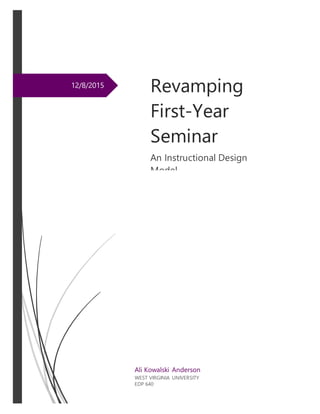
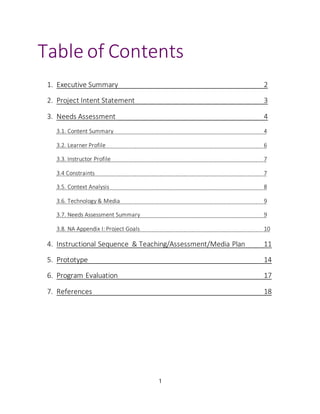
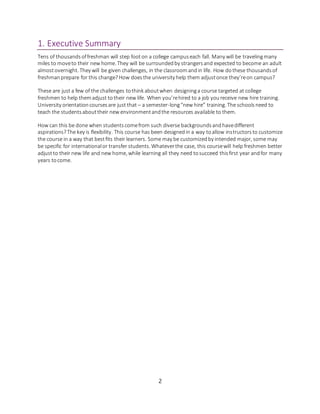
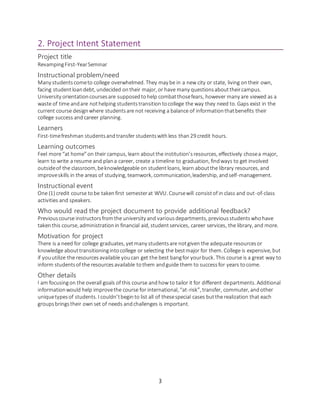
![4
3. Needs Assessment
3.1 Content Summary
Many studentscometo college with little realization of howdemandingcollege is. They may be told
abouttheir future responsibilities as a student, butthey do notunderstandthereality untilthey are on
campusliving the life. Studentshavebeen quotedsaying“The expectations are so much greater in terms
of paper contentand workload[than] in high school,”and“I realized [that] university is a really
independentlearning process andI foundso many thingsI don’tknow,”(Browning& Sheffield, 2008).
First year seminar coursesare popularin many universities, servingas a way to transitionstudentsinto
college from high school. Studiesshowthe importance of this typeof course (Browning& Sheffield, 2008;
Klatt & Ray, 2014), butwithso muchvariation between topics covered howcan we tell if studentsare
really getting the mostout of the seminar? Courses haveutilizing reflective journal writing (Everett,
2013), writingand argumentationskills(Biron, Han, Welsh, & Fox, 2013), andhands-onprojects(Hehong
et al., 2012). Thiswide variety of topicsand techniqueshaveall individually shownto be successful, but
how would they work in collaborationwith each other?
My goal is to design a comprehensivefirst-year seminarcourse that showsstudentstheresources
available to themand providesadditionalopportunitiestolearn abouttheir field of study andtheir new
homefor the next few years.
Course Examples
To help create my class model, I referenced three first-year seminar coursedesigns: the 2010 Adventure
WV trip and course combination, the2015 first-yearseminarat WVU, andthe 2015 first-yearseminar for
engineering students.
Adventure WV Orientation Trip
The Adventure coursewas brokendowninto two main components:thephysical trip andthe post-trip
meetings andreflections. According tothe syllabus(Corio & Schwartz, 2010)andpersonalrecall, here
were the skills andobjectives of thiscourse:
Goals of the trip (5-8 daysin the wilderness):
o Connectionwith other students, bothfreshmenandupperclassmen
o Leadership
o Teamwork
o Community service
o Trust
o Communication
o Self-confidence
o Decision makingskills
o Wilderness skills
o Journalandreflections
Topics for in-personmeetings
o Loan calculator: learn what yourinterest rates look like
o GPA calculator: learn the impact of a bad grade
o Goal letter and post-tripreflections
o Community servicetrip
o Informationsecurity awareness modules](https://image.slidesharecdn.com/ccda2d7f-bc6c-44da-a849-2e1d52664943-160809170622/85/DA7-project-Kowalski-5-320.jpg)
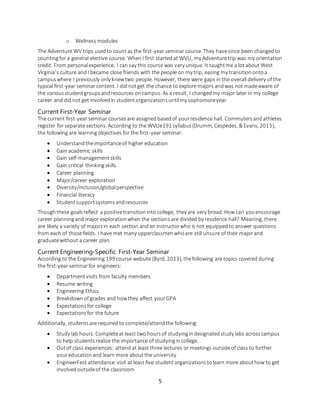
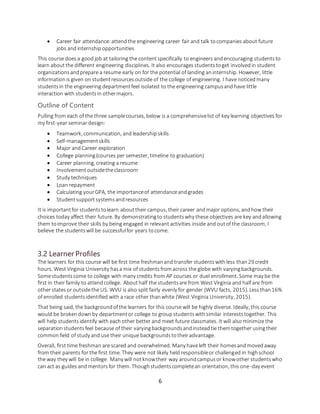
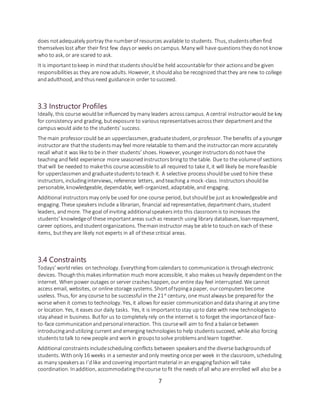
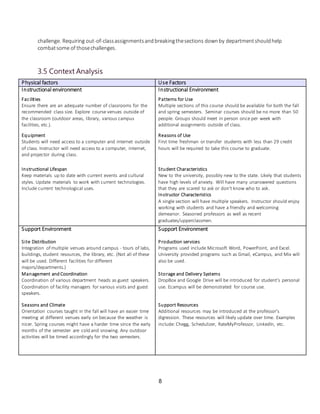

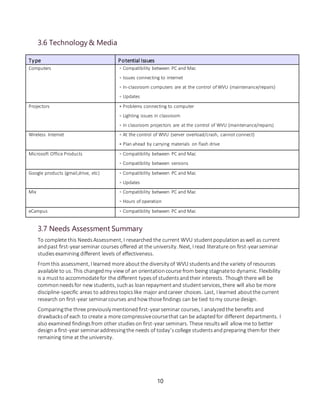
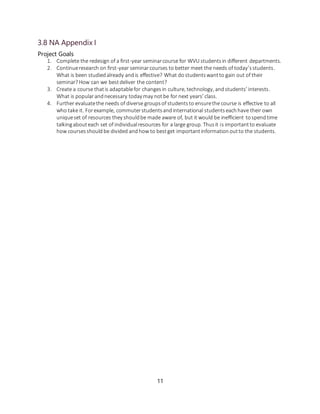
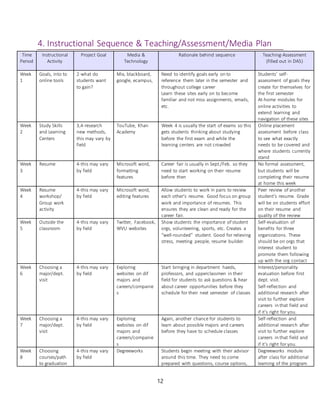
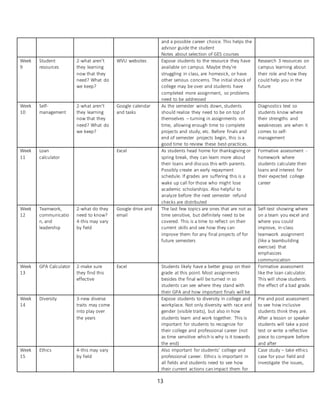
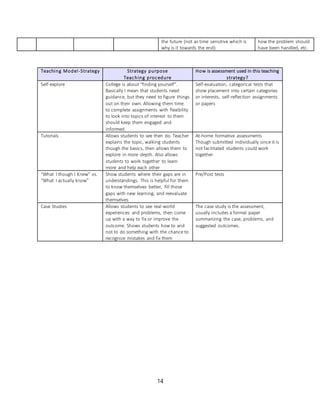
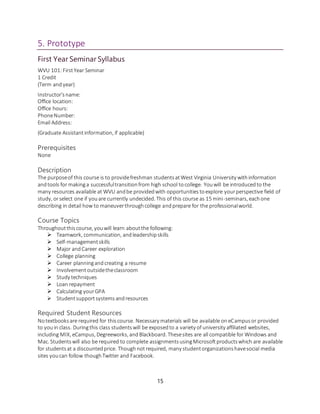
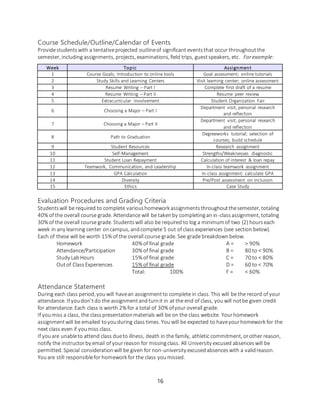



![20
7. References
Browning, C., Sheffield, S. L. (2008)Practice makesperfect? University students’ responsestoafirst-year
transitioncourse. Collected Essayson Learning and Teaching, 122-127
Byrd, J. (2013). Welcometo Engineering 199. Retrievedfrom http://www2.cemr.wvu.edu/~eng199/
Corio, G. , Schwartz, F. (2010). AdventureWV Syllabus[Class handout]. The WVU MountaineerAdventure
Program& The Davis College of Agriculture, WVU, Morgantown, WV. Retrieved from
http://adventurewv.wvu.edu/r/download/67683
Drumm, C., Cespedes, V., Evans, K. (2015). WVUe191B:Firstyearseminar [Class handout]. TRIOStudent
SupportServices, WVU, Morgantown, WV. Retrieved from
http://sss.wvu.edu/r/download/196422
Everett, M. C. (2013). Reflective journal writing andthe first-year experience. InternationalJournalof
Teaching and Learning HigherEducation, 25(2)213-222.
Gulnur, G., Han, A., Welsh, A., Fox, J. (2013). Impactoffirst-year seminar in science onstudentwriting
andargumentation. JournalofCollegeScienceTeaching, 43(1)82-91
Hehong, F., Zhifang, D., Guohua, H., Wang Qilong, S. J., Meng, Z., Yongming, T. (2012). An engineering
introductory seminarcourse for first-year college students. IEEEInternationalConferenceon
Teaching, Assessment,and LearningforEngineering. H1B18-21.
Klatt, J., Ray, R. (2014). Studentacademicoutcomesafter completing a first-yearseminar. NACTA Journal.
288-292.
West Virginia University. (2015). Retrievedfrom http://www.forbes.com/colleges/west-virginia-
university/
WVU Facts. (2015, September, 29). Retrievedfrom https://about.wvu.edu/wvu-facts](https://image.slidesharecdn.com/ccda2d7f-bc6c-44da-a849-2e1d52664943-160809170622/85/DA7-project-Kowalski-21-320.jpg)